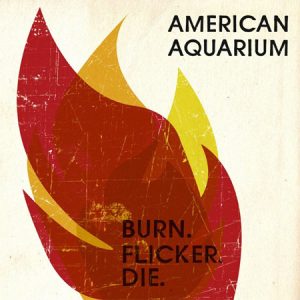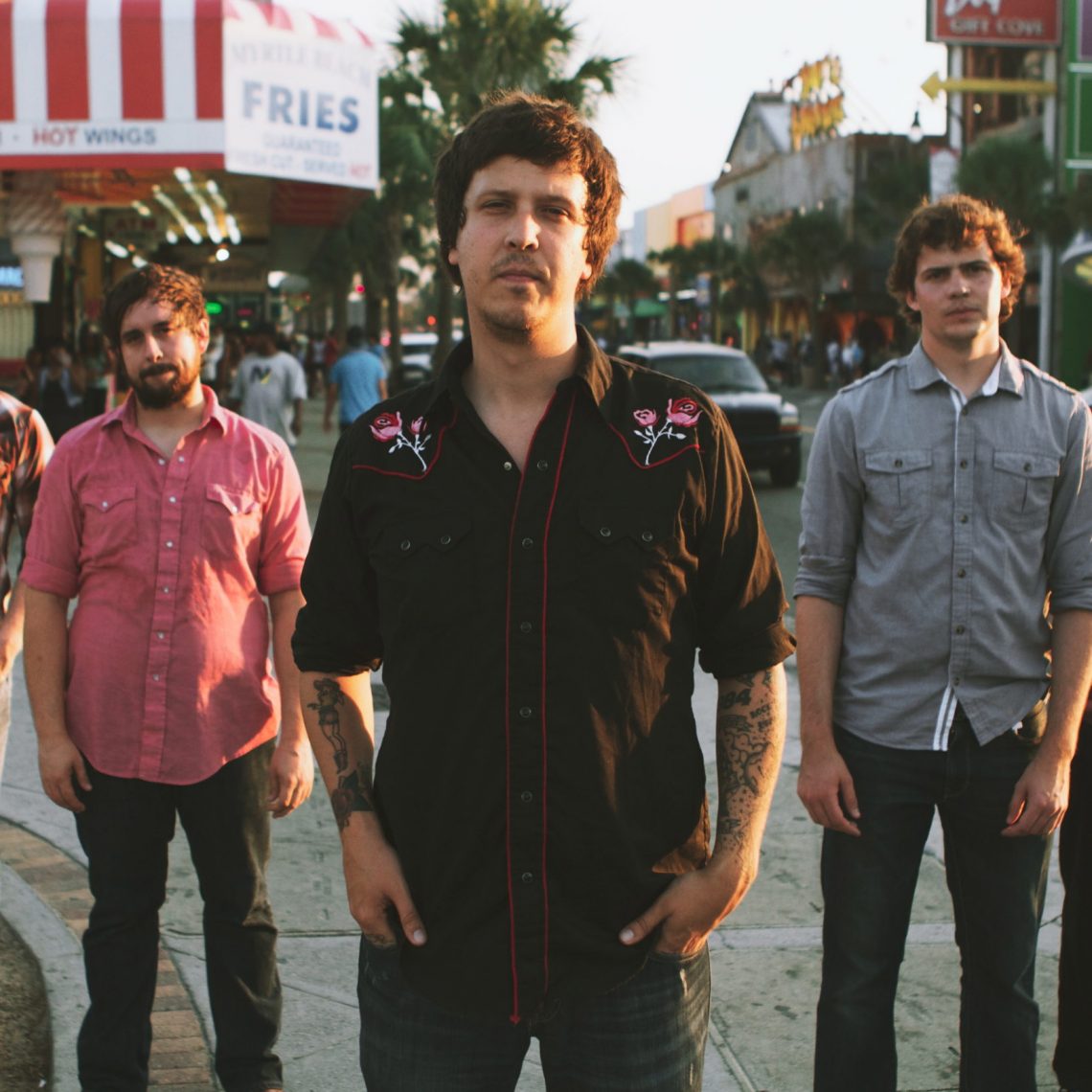By Spencer Griffith
(LSM Jan/Feb 2013/vol. 6 – Issue 1)
The doctors laughed at first, until they saw that I was serious,” recounts American Aquarium bassist Bill Corbin of his emergency room trip the day of the band’s August release party for Burn.Flicker.Die. Corbin had tried to cure a sudden and severe case of abdominal trouble himself the night before with a bottle of Pepto Bismol and a roll of Tums — “I didn’t want to go to the hospital and find out it was just gas; that’d be embarrassing,” — but sought professional help when the pain refused to subside. He needed an appendectomy, which, despite his pleas, couldn’t be delayed until after the sold-out show, so he went under the knife immediately with plans to play later that night.
Following surgery, Corbin was whisked to what he remembers as a hazy sound check. After resting briefly at his sister’s place — he is human, after all — he performed to a hometown crowd at Raleigh, N.C.’s Lincoln Theatre roughly seven hours after leaving the operating table. It’s just that kind of headstrong spirit that’s helped American Aquarium earn a growing and devoted following across the South while spending roughly 1,000 nights on the road over the last four years.
The legend of the outfit’s hard touring is exceeded only by its hard drinking, which finds the band greeted on tour with bottles of Jameson from diehard fans and venue owners. “Bill’s appendix quit the band because his liver was getting too much attention,” pedal steel player Whit Wright half-joked at the time of the Lincoln show, which drew more than 800 attendees from 19 states and four countries, including England and Australia. Many of those same fans were those that helped the quintet fund the release of Burn.Flicker.Die, its fifth full-length, by raising nearly $24,000 from over 300 supporters via Kickstarter late last year after offering lifetime passes, private shows and even its first tour van as rewards.
Considering American Aquarium has put over 450,000 miles on that 2002 Dodge van and its replacement in just half a decade, it’s no surprise that BJ Barham — the band’s singer, songwriter and sole constant — is heavily influenced by their adventures on the road. “Bigger in Texas,” from the band’s 2008 Bones EP, tells of a rough patch the band hit during its first tour through the Lone Star State. “The whole first verse is just about having no money to eat in the state of Texas because we spent it all on booze at the White Water Tavern in Little Rock, Ark.,” Barham explains. “On a map, it looks very short from Austin to El Paso, but we had to drive overnight and it was just dreadfully miserable. It was my first realization of just how big Texas was.”
Viewed through the lens of a small town boy trying to make it big, those experiences consistently color Barham’s songwriting. Soon after moving from rural Reidsville, N.C. — whose American Tobacco Company plant employed hundreds before shutting its doors in the mid-90s — to the capital city of Raleigh to attend North Carolina State University in the fall of 2002, Barham began working at a record store across the street from the school, cultivating interest in everything from hip-hop to alt-country. Raleigh had been fertile ground for the latter since the mid-90s rise of Ryan Adams’ Whiskeytown, along with the less heralded but nearly as influential groups Six String Drag and the Backsliders.
“I knew all the big ones,” Barham says in reference to the holy triumvirate of local alt-country acts, “but I started getting more into the history of Raleigh alt-country and more into national alt-country bands. Working at the Record Exchange really allowed me to immerse myself in the genre and I started getting excited every time Bloodshot or New West or Yep Roc put out a record.”
Barham began playing solo and duo shows around Reidsville following his freshman year of college, taking the name American Aquarium from the opening line of Wilco’s Yankee Hotel Foxtrot. At the same time, he began losing interest in school. “I was a pretty focused student all through high school, but when I got to college, I wasn’t inspired by any subject matter,” he explains. “I had no idea what I wanted to do but I had the misconception that I had to get a degree in something. Then music happened. That became my school”.
Harnessing the power of burgeoning social media platforms like Facebook and MySpace to market his music, Barham was encouraged by hard-working, do-it-yourself bands like Lucero and Drive-By Truckers. “Instead of doing homework or writing term papers, I would find myself missing class and going to shows every night or reading books on how to book your own tour,” Barham remembers. “It fascinated me that we were in an age where you really didn’t need a label to make it in the music industry.” Midway through his junior year, Barham dropped out of school to pursue music full-time. “It was do-or-die; I could become another kid working a shitty job that he hates and playing music on the weekends or I could totally commit to it and jump in the deep end and hope I didn’t drown.”
Barham formed the first full-band iteration of American Aquarium in October 2005, which released its uneven but promising debut Antique Hearts four months later. The band earned plenty of comparisons to Whiskeytown and Adams for the starry-eyed romanticism and twangy arrangements of that record and its much stronger 2008 follow-up, The Bible & The Bottle, which even featured Whiskeytown’s Caitlin Cary on background vocals.
While Barham fails to see the similarities in their early songwriting, he confesses his utmost respect for Adams. “I was an instant fanboy from the first time I picked up [Whiskeytown’s] Stranger’s Almanac,” he remembers. “My senior year in high school, I was listening to a lot of Springsteen and a lot of Dylan. Then I heard Whiskeytown and Uncle Tupelo right around the same time and it was like a punch in the face to me because it had this super fresh, almost punk-rock spirit in Americana music. It was really emotionally deep but it was plain as fuck, and there was something amazing about that for me.”
As the band’s schedule increased in intensity after Antique Hearts, it began seeing more and more fans when returning to the same venues, eventually packing them out with a couple hundred fans where it once sold a handful of tickets. Barham started coming into his own as a prolific but often brash songwriter as the band began experimenting with a broader array of styles. Springsteen and Lucero weighed in heavily on the barroom bravado of 2009’s Dances for the Lonely, while 2010’s plaintive Small Town Hymns was stripped down to simple, bare-bones instrumentation.
Found in studio form on Dances, “I Hope He Breaks Your Heart” — American Aquarium’s signature song — was immortalized early last year on Live in Raleigh. Recorded in December 2011 in front of rabid crowd of hometown faithful at the Pour House — a medium-sized music hall that the group’s long since outgrown but continues to sell out — the live cut becomes a full-crowd shout-along completely devoid of any of Barham’s vocals from the opening note. Across North Carolina, those that don’t know every lyric are always the odd ones out, but that’s increasingly become the case across the act’s Southern footprint as well. “That’s been the song people relate to the most and that was the song that almost didn’t make the record,” Barham said in 2010 about the bitter tune, which had long been a live favorite. “Every city we go to, there are 40 or 50 kids who know every word to that song and are sitting up front screaming it.”
 While tracks such as “Saturday Nights” prove Barham’s hardly forgotten about the loose women he’s met in bars across the country and alternately ranted and raved about on previous records, Burn.Flicker.Die finds the touring musician focusing on the inconsistencies between his romanticized expectations and the harsh realities of his chosen path as he nears 30. “You’re just a two-pack habit with a Southern accent/I’m a pearl-snap poet with bad tattoos,” Barham sings in a moment of self-aware characterization on “St. Mary’s,” while his resignation is never more apparent on likes like “We ain’t ever gonna make it like I thought we would/so why can’t we just pack it up and say we did the best we could?” from “Casualties.”
While tracks such as “Saturday Nights” prove Barham’s hardly forgotten about the loose women he’s met in bars across the country and alternately ranted and raved about on previous records, Burn.Flicker.Die finds the touring musician focusing on the inconsistencies between his romanticized expectations and the harsh realities of his chosen path as he nears 30. “You’re just a two-pack habit with a Southern accent/I’m a pearl-snap poet with bad tattoos,” Barham sings in a moment of self-aware characterization on “St. Mary’s,” while his resignation is never more apparent on likes like “We ain’t ever gonna make it like I thought we would/so why can’t we just pack it up and say we did the best we could?” from “Casualties.”
Between the title cut’s comparison of the band with the lifecycle of neon lights — “We burn too long, we flicker and die,” the refrain goes — and the sober self-realizations of “Jacksonville,” it hardly sounds like a record listeners would want to belt out loud with the band in a crowded bar. But Burn — produced by Jason Isbell and featuring appearances by Cary, Muscle Shoals legend Spooner Oldham, and Amanda Shires — sees Barham and company settling on an original hybrid of driving heartland rock and authentic Americana twang that assuages any fears fans might have.
The five-piece is also quick to settle any concerns Barham’s words on the album might raise about them slowing down. Though they admit to cutting back a bit on dates in an effort to tour smarter, the full-time touring lifestyle is one they’ve worked hard to achieve and have become far too accustomed to to give up. Though it seems paradoxical, “Lonely Ain’t Easy” speaks to both the pitfalls and the allure of the road as Barham steps into the boots of Corbin to sing about the heartbreak of broken marriage, which the bassist realized during a brief break from the road at his now ex-wife’s insistence. “As soon as I found out that I had no marriage to go home to,” Corbin says, “I immediately wanted to get back on the road because it’s what I was passionate about.”
Indeed, playing shows has not only allowed the group to travel across the country but, last spring, to Europe as well, where they’ve had two records released. “It was really hit or miss,” Barham said of the crowds in Spain, France and Germany, which numbered between 20 and 200, “but the people who were coming to shows were super attentive and super appreciative of us being there. It was humbling to have these people taking the train seven hours across another country sometimes to get there.”
When Barham speaks, it’s clear that he’s still excited by the opportunities afforded to him as a traveling musician, despite the accompanying ups and downs. Perhaps of all of Barham’s bold lines on Burn.Flicker.Die, then, there’s one set from the title track that seems to resonant the most: “I’ll find a way to quit when they bury me/because I can’t turn down the drinks when they’re free.” The last line, repeated for emphasis, encapsulates American Aquarium’s commitment both to the rock ‘n’ roll lifestyle and the dangers that come from it.






No Comment